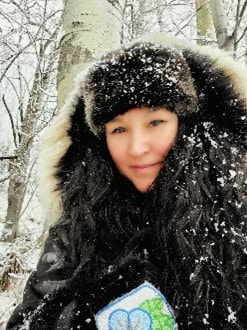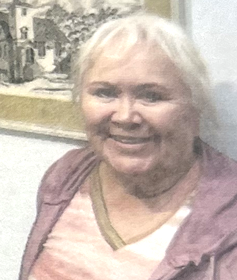Climate Justice
United Women in Faith is committed to addressing the climate crisis by working towards climate justice. Climate change is one of the leading public health challenges in Alaska and throughout our jurisdiction, from mental stress caused by storm, fire, and flood events, to concerns about food security and infrastructure.
We will hear from the Alaska Native Tribal Health Consortium Director of Climate Initiatives, Jackie Qatalina Schaeffer. Jackie also serves as co-principal investigator on the Study of Environmental Arctic Change (SEARCH), focusing on consequences of rapid environmental Arctic change on human well-being. She anticipates finding solutions to respond to climate change in an equitable manner while serving our environmentally threatened communities.
Be prepared to be equipped with knowledge and gain a broader perspective on the root causes of climate injustices. And be sure to visit the JUST ENERGY 4 all exhibit and add your voice to the current United Women in Faith Climate Justice Actions.
United Women in Faith is committed to addressing the climate crisis by working towards climate justice. Climate change is one of the leading public health challenges in Alaska and throughout our jurisdiction, from mental stress caused by storm, fire, and flood events, to concerns about food security and infrastructure.
We will hear from the Alaska Native Tribal Health Consortium Director of Climate Initiatives, Jackie Qatalina Schaeffer. Jackie also serves as co-principal investigator on the Study of Environmental Arctic Change (SEARCH), focusing on consequences of rapid environmental Arctic change on human well-being. She anticipates finding solutions to respond to climate change in an equitable manner while serving our environmentally threatened communities.
Be prepared to be equipped with knowledge and gain a broader perspective on the root causes of climate injustices. And be sure to visit the JUST ENERGY 4 all exhibit and add your voice to the current United Women in Faith Climate Justice Actions.

Leader Jackie Qataliña Schaeffer
Jackie Qataliña Schaeffer, an Iñupiaq from Kotzebue, Alaska, is the Director of Climate Initiatives at the Alaska Native Tribal Health Consortium under the division of Community Environment and Health. For decades she has worked across Alaska holistically infusing indigenous knowledge into a variety of sectors she has experience in, including comprehensive planning, energy, housing, water security, sanitation and climate change adaptation for rural communities. Her passion is to serve the indigenous people of Alaska and provide an indigenous perspective to all her work, including the importance and recognition of traditional philosophies, knowledge and world views. Her current work includes climate change assessments, community engagement, community relocation oversight, and overseeing the Center for Climate and Health and the Center for Environmentally Threatened Communities within the Climate Initiatives program.
Qataliña has co-authored six regional Energy Plans for the State of Alaska, the Oscarville Tribal Adaptation Plan, 2019, and currently works with Newtok and Kivalina on community relocation due to climate change. She is a co-principal investigator on the Human Wellbeing team for the Study of Environmental Arctic Change, a National Science Foundation-funded project through the University of Alaska, Fairbanks. We welcome Ms. Schaeffer!
Jackie Qataliña Schaeffer, an Iñupiaq from Kotzebue, Alaska, is the Director of Climate Initiatives at the Alaska Native Tribal Health Consortium under the division of Community Environment and Health. For decades she has worked across Alaska holistically infusing indigenous knowledge into a variety of sectors she has experience in, including comprehensive planning, energy, housing, water security, sanitation and climate change adaptation for rural communities. Her passion is to serve the indigenous people of Alaska and provide an indigenous perspective to all her work, including the importance and recognition of traditional philosophies, knowledge and world views. Her current work includes climate change assessments, community engagement, community relocation oversight, and overseeing the Center for Climate and Health and the Center for Environmentally Threatened Communities within the Climate Initiatives program.
Qataliña has co-authored six regional Energy Plans for the State of Alaska, the Oscarville Tribal Adaptation Plan, 2019, and currently works with Newtok and Kivalina on community relocation due to climate change. She is a co-principal investigator on the Human Wellbeing team for the Study of Environmental Arctic Change, a National Science Foundation-funded project through the University of Alaska, Fairbanks. We welcome Ms. Schaeffer!
Eliminating Institutional Racism
United Women in Faith’s work on eliminating institutional racism is designed to help us think about our own roles and provide us with framing and grounding for speaking and acting to make a difference close to home and in the world. Institutional racism is discrimination or unequal treatment on the basis of membership in a particular ethnic group (typically one that is a minority or marginalized), arising from systems, structures, or expectations that have become established within an institution or organization.
We are pleased to have Maxine Richert of the Ḵunéix̱ Hídi Northern Light United Church in Juneau, Alaska as our presenter. Maxine will share her experiences as a child in the Memorial Presbyterian Church. The church began in the 19th century as a segregated church for Alaska Native people in Juneau. Under the guidance and ministry of Dr. Walter Soboleff, the church became a vibrant, multicultural church. However, the church was closed and torn down in 1963 to benefit the white Northern Light Presbyterian Church.
A history of the closure of Memorial Presbyterian was painstakingly pieced together, including the truths of insult and injury done to Dr. Soboleff, and the trauma caused to Tlingit people in the community. In 2021, the Truth and Reconciliation committee from the Ḵunéix̱ Hídi Northern Light United Church began an “Overture to Issue Apologies and Reparations for the Racist Closure of Memorial Presbyterian Church.” We will learn about the process and actions to repair the harms caused in this real-life example of Institutional Racism.
United Women in Faith’s work on eliminating institutional racism is designed to help us think about our own roles and provide us with framing and grounding for speaking and acting to make a difference close to home and in the world. Institutional racism is discrimination or unequal treatment on the basis of membership in a particular ethnic group (typically one that is a minority or marginalized), arising from systems, structures, or expectations that have become established within an institution or organization.
We are pleased to have Maxine Richert of the Ḵunéix̱ Hídi Northern Light United Church in Juneau, Alaska as our presenter. Maxine will share her experiences as a child in the Memorial Presbyterian Church. The church began in the 19th century as a segregated church for Alaska Native people in Juneau. Under the guidance and ministry of Dr. Walter Soboleff, the church became a vibrant, multicultural church. However, the church was closed and torn down in 1963 to benefit the white Northern Light Presbyterian Church.
A history of the closure of Memorial Presbyterian was painstakingly pieced together, including the truths of insult and injury done to Dr. Soboleff, and the trauma caused to Tlingit people in the community. In 2021, the Truth and Reconciliation committee from the Ḵunéix̱ Hídi Northern Light United Church began an “Overture to Issue Apologies and Reparations for the Racist Closure of Memorial Presbyterian Church.” We will learn about the process and actions to repair the harms caused in this real-life example of Institutional Racism.

Leader: Maxine Richert
Maxine Richert is Tlingit/Athabascan, born and raised in Juneau, Alaska. She holds a bachelor's degree in psychology and a master's degree in public administration and worked for tribal government and Sealaska Corporation where she retired as VP/Corporate Secretary. During her career she served on various Native advocacy organizations, KTOO Board, the University of Alaska Southeast Advisory Committee, and the Juneau Rotary Club. As a former member of Dr. Walter Soboleff's Memorial Presbyterian Church, she served on Ḵunéix̱ Hídi Northern Light United Church's Overture Subcommittee and currently serves on the Church Council, Native Ministries Committee, and Healing Task Force. As Advocate for the Overture, she spoke on the overture before her church, the Northwest Coast Presbytery, and the Presbyterian Church U.S.A) with all three entities approving the resolution Regarding Acknowledgement, Apology, and Reparations. We are pleased to have Ms. Richert with us.
Maxine Richert is Tlingit/Athabascan, born and raised in Juneau, Alaska. She holds a bachelor's degree in psychology and a master's degree in public administration and worked for tribal government and Sealaska Corporation where she retired as VP/Corporate Secretary. During her career she served on various Native advocacy organizations, KTOO Board, the University of Alaska Southeast Advisory Committee, and the Juneau Rotary Club. As a former member of Dr. Walter Soboleff's Memorial Presbyterian Church, she served on Ḵunéix̱ Hídi Northern Light United Church's Overture Subcommittee and currently serves on the Church Council, Native Ministries Committee, and Healing Task Force. As Advocate for the Overture, she spoke on the overture before her church, the Northwest Coast Presbytery, and the Presbyterian Church U.S.A) with all three entities approving the resolution Regarding Acknowledgement, Apology, and Reparations. We are pleased to have Ms. Richert with us.